#copyfight
Text
“If buying isn’t owning, piracy isn’t stealing”

20 years ago, I got in a (friendly) public spat with Chris Anderson, who was then the editor in chief of Wired. I'd publicly noted my disappointment with glowing Wired reviews of DRM-encumbered digital devices, prompting Anderson to call me unrealistic for expecting the magazine to condemn gadgets for their DRM:
https://longtail.typepad.com/the_long_tail/2004/12/is_drm_evil.html
I replied in public, telling him that he'd misunderstood. This wasn't an issue of ideological purity – it was about good reviewing practice. Wired was telling readers to buy a product because it had features x, y and z, but at any time in the future, without warning, without recourse, the vendor could switch off any of those features:
https://memex.craphound.com/2004/12/29/cory-responds-to-wired-editor-on-drm/
I proposed that all Wired endorsements for DRM-encumbered products should come with this disclaimer:
WARNING: THIS DEVICE’S FEATURES ARE SUBJECT TO REVOCATION WITHOUT NOTICE, ACCORDING TO TERMS SET OUT IN SECRET NEGOTIATIONS. YOUR INVESTMENT IS CONTINGENT ON THE GOODWILL OF THE WORLD’S MOST PARANOID, TECHNOPHOBIC ENTERTAINMENT EXECS. THIS DEVICE AND DEVICES LIKE IT ARE TYPICALLY USED TO CHARGE YOU FOR THINGS YOU USED TO GET FOR FREE — BE SURE TO FACTOR IN THE PRICE OF BUYING ALL YOUR MEDIA OVER AND OVER AGAIN. AT NO TIME IN HISTORY HAS ANY ENTERTAINMENT COMPANY GOTTEN A SWEET DEAL LIKE THIS FROM THE ELECTRONICS PEOPLE, BUT THIS TIME THEY’RE GETTING A TOTAL WALK. HERE, PUT THIS IN YOUR MOUTH, IT’LL MUFFLE YOUR WHIMPERS.
Wired didn't take me up on this suggestion.
But I was right. The ability to change features, prices, and availability of things you've already paid for is a powerful temptation to corporations. Inkjet printers were always a sleazy business, but once these printers got directly connected to the internet, companies like HP started pushing out "security updates" that modified your printer to make it reject the third-party ink you'd paid for:
https://www.eff.org/deeplinks/2020/11/ink-stained-wretches-battle-soul-digital-freedom-taking-place-inside-your-printer
Now, this scam wouldn't work if you could just put things back the way they were before the "update," which is where the DRM comes in. A thicket of IP laws make reverse-engineering DRM-encumbered products into a felony. Combine always-on network access with indiscriminate criminalization of user modification, and the enshittification will follow, as surely as night follows day.
This is the root of all the right to repair shenanigans. Sure, companies withhold access to diagnostic codes and parts, but codes can be extracted and parts can be cloned. The real teeth in blocking repair comes from the law, not the tech. The company that makes McDonald's wildly unreliable McFlurry machines makes a fortune charging franchisees to fix these eternally broken appliances. When a third party threatened this racket by reverse-engineering the DRM that blocked independent repair, they got buried in legal threats:
https://pluralistic.net/2021/04/20/euthanize-rentier-enablers/#cold-war
Everybody loves this racket. In Poland, a team of security researchers at the OhMyHack conference just presented their teardown of the anti-repair features in NEWAG Impuls locomotives. NEWAG boobytrapped their trains to try and detect if they've been independently serviced, and to respond to any unauthorized repairs by bricking themselves:
https://mamot.fr/@[email protected]/111528162905209453
Poland is part of the EU, meaning that they are required to uphold the provisions of the 2001 EU Copyright Directive, including Article 6, which bans this kind of reverse-engineering. The researchers are planning to present their work again at the Chaos Communications Congress in Hamburg this month – Germany is also a party to the EUCD. The threat to researchers from presenting this work is real – but so is the threat to conferences that host them:
https://www.cnet.com/tech/services-and-software/researchers-face-legal-threats-over-sdmi-hack/
20 years ago, Chris Anderson told me that it was unrealistic to expect tech companies to refuse demands for DRM from the entertainment companies whose media they hoped to play. My argument – then and now – was that any tech company that sells you a gadget that can have its features revoked is defrauding you. You're paying for x, y and z – and if they are contractually required to remove x and y on demand, they are selling you something that you can't rely on, without making that clear to you.
But it's worse than that. When a tech company designs a device for remote, irreversible, nonconsensual downgrades, they invite both external and internal parties to demand those downgrades. Like Pavel Chekov says, a phaser on the bridge in Act I is going to go off by Act III. Selling a product that can be remotely, irreversibly, nonconsensually downgraded inevitably results in the worst person at the product-planning meeting proposing to do so. The fact that there are no penalties for doing so makes it impossible for the better people in that meeting to win the ensuing argument, leading to the moral injury of seeing a product you care about reduced to a pile of shit:
https://pluralistic.net/2023/11/25/moral-injury/#enshittification
But even if everyone at that table is a swell egg who wouldn't dream of enshittifying the product, the existence of a remote, irreversible, nonconsensual downgrade feature makes the product vulnerable to external actors who will demand that it be used. Back in 2022, Adobe informed its customers that it had lost its deal to include Pantone colors in Photoshop, Illustrator and other "software as a service" packages. As a result, users would now have to start paying a monthly fee to see their own, completed images. Fail to pay the fee and all the Pantone-coded pixels in your artwork would just show up as black:
https://pluralistic.net/2022/10/28/fade-to-black/#trust-the-process
Adobe blamed this on Pantone, and there was lots of speculation about what had happened. Had Pantone jacked up its price to Adobe, so Adobe passed the price on to its users in the hopes of embarrassing Pantone? Who knows? Who can know? That's the point: you invested in Photoshop, you spent money and time creating images with it, but you have no way to know whether or how you'll be able to access those images in the future. Those terms can change at any time, and if you don't like it, you can go fuck yourself.
These companies are all run by CEOs who got their MBAs at Darth Vader University, where the first lesson is "I have altered the deal, pray I don't alter it further." Adobe chose to design its software so it would be vulnerable to this kind of demand, and then its customers paid for that choice. Sure, Pantone are dicks, but this is Adobe's fault. They stuck a KICK ME sign to your back, and Pantone obliged.
This keeps happening and it's gonna keep happening. Last week, Playstation owners who'd bought (or "bought") Warner TV shows got messages telling them that Warner had walked away from its deal to sell videos through the Playstation store, and so all the videos they'd paid for were going to be deleted forever. They wouldn't even get refunds (to be clear, refunds would also be bullshit – when I was a bookseller, I didn't get to break into your house and steal the books I'd sold you, not even if I left some cash on your kitchen table).
Sure, Warner is an unbelievably shitty company run by the single most guillotineable executive in all of Southern California, the loathsome David Zaslav, who oversaw the merger of Warner with Discovery. Zaslav is the creep who figured out that he could make more money cancelling completed movies and TV shows and taking a tax writeoff than he stood to make by releasing them:
https://aftermath.site/there-is-no-piracy-without-ownership
Imagine putting years of your life into making a program – showing up on set at 5AM and leaving your kids to get their own breakfast, performing stunts that could maim or kill you, working 16-hour days during the acute phase of the covid pandemic and driving home in the night, only to have this absolute turd of a man delete the program before anyone could see it, forever, to get a minor tax advantage. Talk about moral injury!
But without Sony's complicity in designing a remote, irreversible, nonconsensual downgrade feature into the Playstation, Zaslav's war on art and creative workers would be limited to material that hadn't been released yet. Thanks to Sony's awful choices, David Zaslav can break into your house, steal your movies – and he doesn't even have to leave a twenty on your kitchen table.
The point here – the point I made 20 years ago to Chris Anderson – is that this is the foreseeable, inevitable result of designing devices for remote, irreversible, nonconsensual downgrades. Anyone who was paying attention should have figured that out in the GW Bush administration. Anyone who does this today? Absolute flaming garbage.
Sure, Zaslav deserves to be staked out over an anthill and slathered in high-fructose corn syrup. But save the next anthill for the Sony exec who shipped a product that would let Zaslav come into your home and rob you. That piece of shit knew what they were doing and they did it anyway. Fuck them. Sideways. With a brick.
Meanwhile, the studios keep making the case for stealing movies rather than paying for them. As Tyler James Hill wrote: "If buying isn't owning, piracy isn't stealing":
https://bsky.app/profile/tylerjameshill.bsky.social/post/3kflw2lvam42n

If you'd like an essay-formatted version of this post to read or share, here's a link to it on pluralistic.net, my surveillance-free, ad-free, tracker-free blog:
https://pluralistic.net/2023/12/08/playstationed/#tyler-james-hill

Image:
Alan Levine (modified)
https://pxhere.com/en/photo/218986
CC BY 2.0
https://creativecommons.org/licenses/by/2.0/
#pluralistic#playstation#sony#copyright#copyfight#drm#monopoly#enshittification#batgirl#road runner#financiazation#the end of ownership#ip
23K notes
·
View notes
Text
The word of the day is "Valancourt"
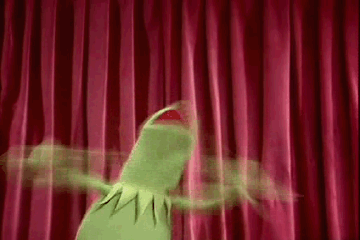
I need to flail about copyright law, and a DC Circuit Court decision that happened, err, yesterday:
Valancourt Books, LLC v. Merrick Garland, No. 21-5203 (D.C. Cir. 2023)
(You can google it. The Justia link has the full PDF.)
The ultra-short, tl;dr: Publishers don't have to submit 2 copies of their books to the Library of Congress anymore.
More details: Valancourt is an indie book publisher who skipped the "send two copies to the Library of Congress" part of copyright registration, in part because many of their works were public domain reprints, and in part because, well, they're a tiny indie publisher operating on a shoestring budget
I don't know how the LoC happened to notice them (certainly the vast majority of published works are NOT sent to the LoC, even if we leave out the digital works), but they did, and ordered them to send 2 copies of each of their works or face a hefty (for a small publisher) fine.
Valancourt fought back, claiming that, among other problems, the law (17 U.S. Code § 407 - Deposit of copies or phonorecords for Library of Congress) violates the 5th Amendment - it demands property of citizens without compensation.
Two lower courts sided with the gov't, saying that the benefits of copyright are extensive.
The DC Circuit court disagreed (emphasis added):
In urging us to view mandatory deposit as part of a voluntary exchange, the government cites the many benefits that copyright confers upon authors. But authors obtain those benefits upon fixation, and mandatory deposit grants no additional benefits. Tellingly, the government cannot point to a single incremental benefit that copyright owners receive for depositing works pursuant to Section 407. That provision then cannot represent a voluntary exchange for a benefit—there is no benefit at all.
Originally, depositing copies was a requirement of copyright registration - no copies, no copyright protection. Simple. Even had a practical purpose: in cases of infringement, the gov't had a copy of the original work to haul out to compare.
But the Copyright Act of 1976 threw that out - works were copyrighted "upon fixation of a work in a tangible medium," no registration required, not even the little © symbol.
Registration is required to pursue infringement claims. But. "The Act also removed loss of copyright as a sanction for failure to deposit." The 1976 Copyright Act was designed to say EVERYTHING IS COPYRIGHTED NO MATTER WHAT and not require anyone [companies] to do anything to secure those rights.
...It's been nearly 50 years since depositing 2 copies has given any benefit to publishers, but of course, they keep doing it, because the penalty for not doing so is heavy government fines.
Until someone (Valancourt) successfully argued that "requiring property without compensation" is a violation of our 5th amendment rights.
20 notes
·
View notes
Text
what is Artificial Intelligence AI
Artificial Intelligence (AI) is a field of computer science that focuses on the development of machines and software that can perform tasks that typically require human intelligence, such as perception, reasoning, learning, decision-making, and natural language processing. AI systems are designed to analyse data, recognize patterns, and make predictions or decisions based on that data. The goal of AI is to create machines that can think, reason, and learn like humans, and to develop intelligent systems that can automate tasks and improve our lives in various ways.
How Does AI Work
AI systems are designed to analyze and process vast amounts of data in real-time and derive insights from that data to make predictions or take actions. There are three main types of AI systems: rule-based systems, machine learning, and deep learning.
1.Rule-Based Systems
Rule-based systems are the simplest form of AI and rely on a set of pre-defined rules to make decisions. These systems work by analyzing data and applying specific rules to make decisions. For example, a rule-based system might be programmed to diagnose a disease based on a set of symptoms. The system would analyze the data, apply the rules, and then provide a diagnosis based on the outcome.
2.Machine Learning
Machine learning is a more advanced form of AI that involves teaching machines to learn from data without being explicitly programmed. This is done through a process known as training, in which machines are fed large amounts of data and algorithms are used to identify patterns and learn from the data. machinelearningmastery/ The machine then applies what it has learned to new data to make predictions or take actions.
There are three main types of machine learning: supervised learning, unsupervised learning, and reinforcement learning.
Supervised Learning: Supervised learning is a type of machine learning where the algorithm learns to make predictions by analyzing labelled training data. In this type of learning, the algorithm is trained using input-output pairs, where the input is a set of features or attributes, and the output is a labelled target value. The goal of supervised learning is to find a mapping between the input and output variables so that the algorithm can accurately predict the output for new, unseen inputs.
Examples of supervised learning include predicting the price of a house based on its features or diagnosing a patient’s illness based on their symptoms.
Unsupervised Learning: Unsupervised learning is a type of machine learning where the algorithm learns to identify patterns and relationships in unlabelled data. In unsupervised learning, the algorithm is given a set of inputs without any corresponding output labels, and it must find patterns or groupings in the data on its own.
Examples of unsupervised learning include identifying groups of similar customers in a marketing dataset or finding patterns in unstructured text data.
#pluralistic#luddie#chokepoint capitalism#generative ai#artificial intelligence#voice acting#labor#creative labor#exclusive rights regimes#copyright#copyfight#careful what you wish for#machine learning#ai#ml#blurred lines#melancholy elephants
2 notes
·
View notes
Text

A massive victory for fair use in the longrunning Dr Seuss vs Star Trek parody lawsuit http://bit.ly/2FbTNNc http://bit.ly/2FbTNNc
2 notes
·
View notes
Video
youtube
“...The internet destroyed copyright law and we have not re-built. Instead of laws and courts we now have claims and disputes...”
0 notes
Conversation
Does code have the right to defend itself?
0 notes
Text
[..]desperate farmers jailbreaking their tractors' DRM to bring in the harvest
[..]desperate farmers jailbreaking their tractors’ DRM to bring in the harvest
[..]desperate farmers jailbreaking their tractors’ DRM to bring in the harvest
Via BoingBoing.net
John Deere says that farmers don’t really own their tractors— even the ones they buy used! — because the copyrighted software necessary to run those tractors is licensed, not sold. They say that the fine-print on the license agreement, combined with the ban on breaking software locks in Section 1201…
View On WordPress
#Copyfight#Copyfight / drm / john deere / right to repair / war on general purpose computing#drm#john deere#right to repair#war on general purpose computing
0 notes
Text
It all started with a mouse
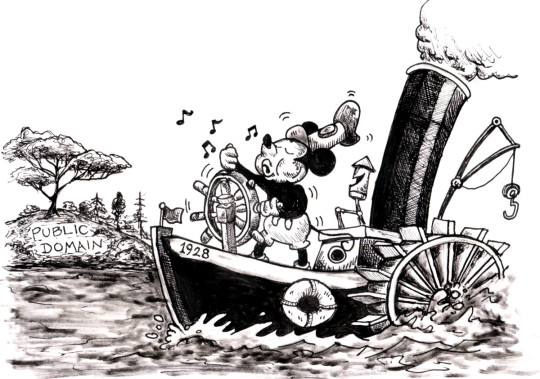
For the public domain, time stopped in 1998, when the Sonny Bono Copyright Act froze copyright expirations for 20 years. In 2019, time started again, with a massive crop of works from 1923 returning to the public domain, free for all to use and adapt:
https://web.law.duke.edu/cspd/publicdomainday/2019/
No one is better at conveying the power of the public domain than Jennifer Jenkins and James Boyle, who run the Duke Center for the Study of the Public Domain. For years leading up to 2019, the pair published an annual roundup of what we would have gotten from the public domain in a universe where the 1998 Act never passed. Since 2019, they've switched to celebrating what we're actually getting each year. Last year's was a banger:
https://pluralistic.net/2022/12/20/free-for-2023/#oy-canada
But while there's been moderate excitement at the publicdomainification of "Yes, We Have No Bananas," AA Milne's "Now We Are Six," and Sherlock Holmes, the main event that everyone's anticipated arrives on January 1, 2024, when Mickey Mouse enters the public domain.
The first appearance of Mickey Mouse was in 1928's Steamboat Willie. Disney was critical to the lobbying efforts that extended copyright in 1976 and again in 1998, so much so that the 1998 Act is sometimes called the Mickey Mouse Protection Act. Disney and its allies were so effective at securing these regulatory gifts that many people doubted that this day would ever come. Surely Disney would secure another retrospective copyright term extension before Jan 1, 2024. I had long arguments with comrades about this – people like Project Gutenberg founder Michael S Hart (RIP) were fatalistically certain the public domain would never come back.
But they were wrong. The public outrage over copyright term extensions came too late to stave off the slow-motion arson of the 1976 and 1998 Acts, but it was sufficient to keep a third extension away from the USA. Canada wasn't so lucky: Justin Trudeau let Trump bully him into taking 20 years' worth of works out of Canada's public domain in the revised NAFTA agreement, making swathes of works by living Canadian authors illegal at the stroke of a pen, in a gift to the distant descendants of long-dead foreign authors.
Now, with Mickey's liberation bare days away, there's a mounting sense of excitement and unease. Will Mickey actually be free? The answer is a resounding YES! (albeit with a few caveats). In a prelude to this year's public domain roundup, Jennifer Jenkins has published a full and delightful guide to The Mouse and IP from Jan 1 on:
https://web.law.duke.edu/cspd/mickey/
Disney loves the public domain. Its best-loved works, from The Sorcerer's Apprentice to Sleeping Beauty, Pinnocchio to The Little Mermaid, are gorgeous, thoughtful, and lively reworkings of material from the public domain. Disney loves the public domain – we just wish it would share.
Disney loves copyright's other flexibilities, too, like fair use. Walt told the papers that he took his inspiration for Steamboat Willie from Charlie Chaplin and Douglas Fairbanks, making fair use of their performances to imbue Mickey with his mischief and derring do. Disney loves fair use – we just wish it would share.
Disney loves copyright's limitations. Steamboat Willie was inspired by Buster Keaton's silent film Steamboat Bill (titles aren't copyrightable). Disney loves copyright's limitations – we just wish it would share.
As Jenkins writes, Disney's relationship to copyright is wildly contradictory. It's the poster child for the public domain's power as a source of inspiration for worthy (and profitable) new works. It's also the chief villain in the impoverishment and near-extinction of the public domain. Truly, every pirate wants to be an admiral.
Disney's reliance on – and sabotage of – the public domain is ironic. Jenkins compares it to "an oil company relying on solar power to run its rigs." Come January 1, Disney will have to share.
Now, if you've heard anything about this, you've probably been told that Mickey isn't really entering the public domain. Between trademark claims and later copyrightable elements of Mickey's design, Mickey's status will be too complex to understand. That's totally wrong.

Jenkins illustrates the relationship between these three elements in (what else) a Mickey-shaped Venn diagram. Topline: you can use all the elements of Mickey that are present in Steamboat Willie, along with some elements that were added later, provided that you make it clear that your work isn't affiliated with Disney.
Let's unpack that. The copyrightable status of a character used to be vague and complex, but several high-profile cases have brought clarity to the question. The big one is Les Klinger's case against the Arthur Conan Doyle estate over Sherlock Holmes. That case established that when a character appears in both public domain and copyrighted works, the character is in the public domain, and you are "free to copy story elements from the public domain works":
https://freesherlock.files.wordpress.com/2013/12/klinger-order-on-motion-for-summary-judgment-c.pdf
This case was appealed all the way to the Supreme Court, who declined to hear it. It's settled law.
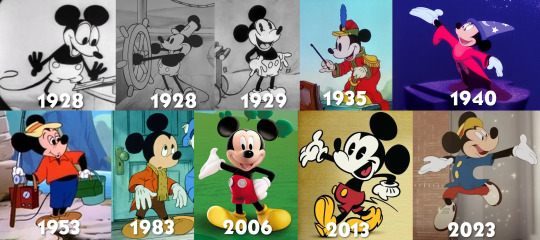
So, which parts of Mickey aren't going into the public domain? Elements that came later: white gloves, color. But that doesn't mean you can't add different gloves, or different colorways. The idea of a eyes with pupils is not copyrightable – only the specific eyes that Disney added.
Other later elements that don't qualify for copyright: a squeaky mouse voice, being adorable, doing jaunty dances, etc. These are all generic characteristics of cartoon mice, and they're free for you to use. Jenkins is more cautious on whether you can give your Mickey red shorts. She judges that "a single, bright, primary color for an article of clothing does not meet the copyrightability threshold" but without settled law, you might wanna change the colors.
But what about trademark? For years, Disney has included a clip from Steamboat Willie at the start of each of its films. Many observers characterized this as a bid to create a de facto perpetual copyright, by making Steamboat Willie inescapably associated with products from Disney, weaving an impassable web of trademark tripwires around it.
But trademark doesn't prevent you from using Steamboat Willie. It only prevents you from misleading consumers "into thinking your work is produced or sponsored by Disney." Trademarks don't expire so long as they're in use, but uses that don't create confusion are fair game under trademark.
Copyrights and trademarks can overlap. Mickey Mouse is a copyrighted character, but he's also an indicator that a product or service is associated with Disney. While Mickey's copyright expires in a couple weeks, his trademark doesn't. What happens to an out-of-copyright work that is still a trademark?
Luckily for us, this is also a thoroughly settled case. As in, this question was resolved in a unanimous 2000 Supreme Court ruling, Dastar v. Twentieth Century Fox. A live trademark does not extend an expired copyright. As the Supremes said:
[This would] create a species of mutant copyright law that limits the public’s federal right to copy and to use expired copyrights.
This elaborates on the Ninth Circuit's 1996 Maljack Prods v Goodtimes Home Video Corp:
[Trademark][ cannot be used to circumvent copyright law. If material covered by copyright law has passed into the public domain, it cannot then be protected by the Lanham Act without rendering the Copyright Act a nullity.
Despite what you might have heard, there is no ambiguity here. Copyrights can't be extended through trademark. Period. Unanimous Supreme Court Decision. Boom. End of story. Done.
But even so, there are trademark considerations in how you use Steamboat Willie after Jan 1, but these considerations are about protecting the public, not Disney shareholders. Your uses can't be misleading. People who buy or view your Steamboat Willie media or products have to be totally clear that your work comes from you, not Disney.

Avoiding confusion will be very hard for some uses, like plush toys, or short idents at the beginning of feature films. For most uses, though, a prominent disclaimer will suffice. The copyright page for my 2003 debut novel Down and Out in the Magic Kingdom contains this disclaimer:
This novel is a work of fiction, set in an imagined future. All the characters and events portrayed in this book, including the imagined future of the Magic Kingdom, are either fictitious or are used fictitiously. The Walt Disney Company has not authorized or endorsed this novel.
https://us.macmillan.com/books/9781250196385/downandoutinthemagickingdom
Here's the Ninth Circuit again:
When a public domain work is copied, along with its title, there is little likelihood of confusion when even the most minimal steps are taken to distinguish the publisher of the original from that of the copy. The public is receiving just what it believes it is receiving—the work with which the title has become associated. The public is not only unharmed, it is unconfused.
Trademark has many exceptions. The First Amendment protects your right to use trademarks in expressive ways, for example, to recreate famous paintings with Barbie dolls:
https://www.copyright.gov/fair-use/summaries/mattel-walkingmountain-9thcir2003.pdf
And then there's "nominative use": it's not a trademark violation to use a trademark to accurately describe a trademarked thing. "We fix iPhones" is not a trademark violation. Neither is 'Works with HP printers.' This goes double for "expressive" uses of trademarks in new works of art:
https://en.wikipedia.org/wiki/Rogers_v._Grimaldi
What about "dilution"? Trademark protects a small number of superbrands from uses that "impair the distinctiveness or harm the reputation of the famous mark, even when there is no consumer confusion." Jenkins says that the Mickey silhouette and the current Mickey character designs might be entitled to protection from dilution, but Steamboat Willie doesn't make the cut.
Jenkins closes with a celebration of the public domain's ability to inspire new works, like Disney's Three Musketeers, Disney's Christmas Carol, Disney's Beauty and the Beast, Disney's Around the World in 80 Days, Disney's Alice in Wonderland, Disney's Snow White, Disney's Hunchback of Notre Dame, Disney's Sleeping Beauty, Disney's Cinderella, Disney's Little Mermaid, Disney's Pinocchio, Disney's Huck Finn, Disney's Robin Hood, and Disney's Aladdin. These are some of the best-loved films of the past century, and made Disney a leading example of what talented, creative people can do with the public domain.
As of January 1, Disney will start to be an example of what talented, creative people give back to the public domain, joining Dickens, Dumas, Carroll, Verne, de Villeneuve, the Brothers Grimm, Twain, Hugo, Perrault and Collodi.
Public domain day is 17 days away. Creators of all kinds: start your engines!

If you'd like an essay-formatted version of this post to read or share, here's a link to it on pluralistic.net, my surveillance-free, ad-free, tracker-free blog:
https://pluralistic.net/2023/12/15/mouse-liberation-front/#free-mickey

Image:
Doo Lee (modified)
https://web.law.duke.edu/sites/default/files/images/centers/cspd/pdd2024/mickey/Steamboat-WIllie-Enters-Public-Domain.jpeg
CC BY 4.0
https://creativecommons.org/licenses/by/4.0/deed.en
#pluralistic#copyfight#scotus#mickey mouse#public domain#ip#contract#trademark#tm#jennifer jenkins#copyright#disney#nominative use
6K notes
·
View notes
Text
OTW at Library of Congress - DMCA hearings
@rustiejs - you asked about this in a reply on another thread but I didn't want this buried under 150 other comments. The OTW has been arguing for DRM-removal rights exemptions to the DMCA since 2009.
Replies to their followup questions: https://www.transformativeworks.org/otw-responds-questions-copyright-office-regarding-proposed-dmca-exemptions-remix-artistsvidders/
OTW at the Library of Congress in 2012:
Testimony link: https://tushnet.blogspot.com/2012/06/dmca-remix.html
2015 version (these hearings happen every 3 years):
I don't see any related posts from 2018; I think they testified/filed things, but there's no news post tagged DMCA for it. (Also I think the major media corporations have given up, at this point.)
The OTW's DMCA tag has more info.
The first year: the media companies were deeply upset, but caught off-guard; they weren't expecting any opposition or requests for exemptions, especially not from a combined front of the EFF and this upstart org about... fanfic? That's... Star Trek stories, right? Why are the Trekkie women talking about DVD software?
...Wait, how are the Trekkie women talking about legal rights and creative expression and transformative (wtf is that?) works and what do you mean they have VIDEO ART and they're claiming it needs DRM removal??? Why do they have testimony from professors as well? No no no; if you need to use video clips in a film studies class, you can totally play the movie on a TV and record that with a camera, okay? (...This argument was not deemed convincing.)
The next round, in 2012, they came prepared... with everything but actual logic based on legal precedents.
28 notes
·
View notes
Text
Everything you need to know about Europe’s new copyright directive
Yesterday, the European Parliament approved amendments to the controversial Copyright Directive, a piece of legislation intended to update copyright for the internet age. Few pieces of legislation have polarized Europe this much in recent years. Critics said the vote heralded the death of the internet, while supporters congratulated themselves for saving the livelihoods of starving artists and giving US tech giants a poke in the eye.
via https://www.theverge.com/2018/9/13/17854158/eu-copyright-directive-article-13-11-internet-censorship-google
1 note
·
View note
Text
Copyfight
And of course YouTube zaps my latest AMV within MINUTES. I upload, jump in the shower, and by the time I towel dry off, it’s blocked in all countries. *MIDDLE FINGER TO YOUTUBE and TV TOKYO and Alfa Matrix*
The song isn’t mine, the video clips are not mine, but the unique juxtaposition of THAT music with THOSE images and the editing to line them up IS my unique work so FUCK YOU. Nobody else did it in the world but me and it looks fucking COOL but NOPE, NOBODY GETS TO SEE IT.
0 notes
Photo
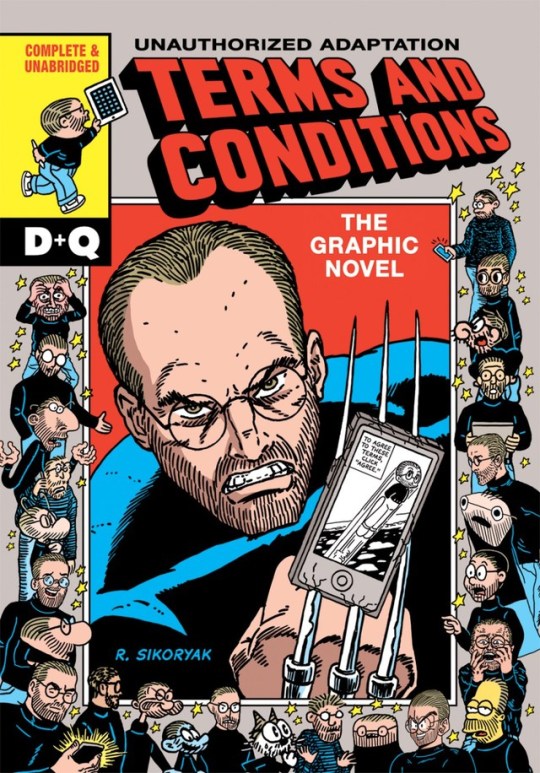


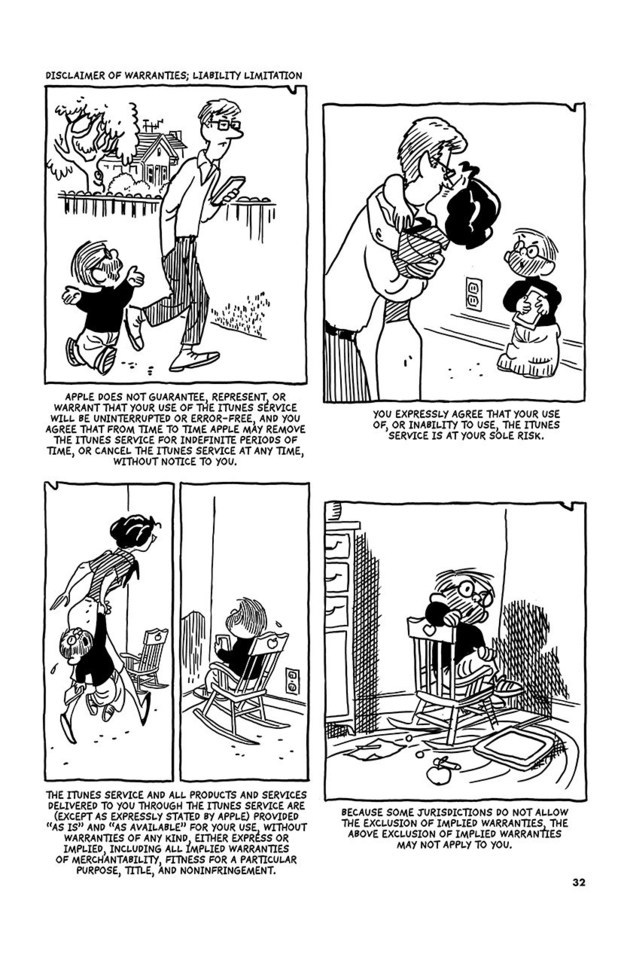
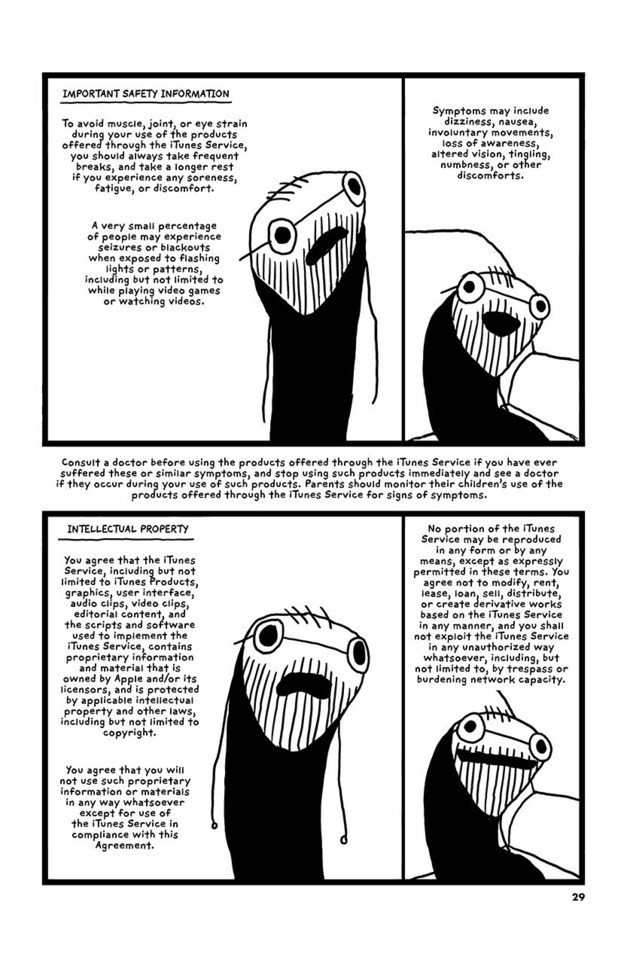
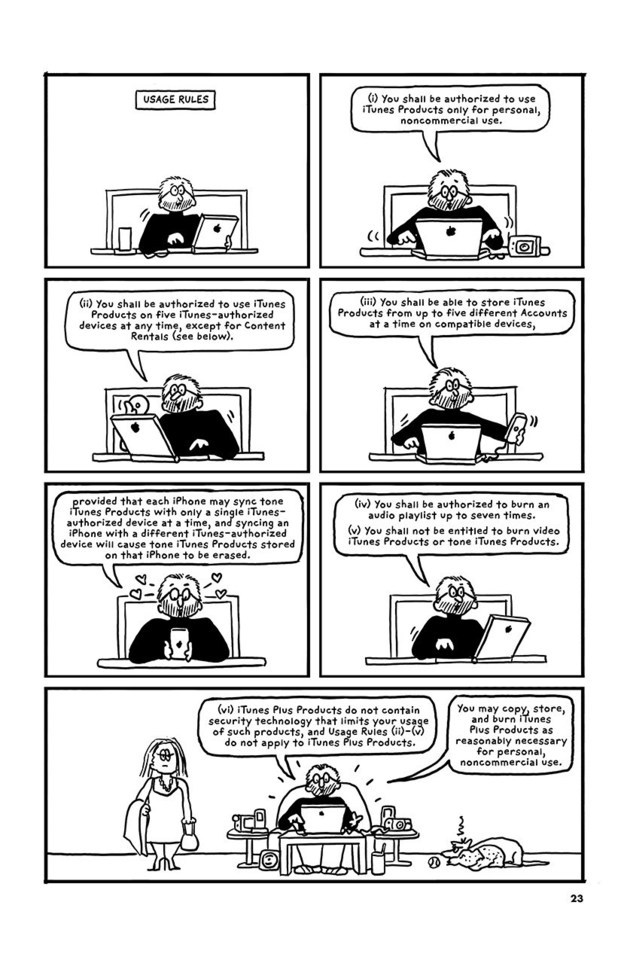


Terms and Conditions: the bloviating cruft of the iTunes EULA combined with extraordinary comic book mashups
Back in 2015, cartoonist Robert Sikoryak started publishing single pages from his upcoming graphic novel Terms and Conditions, in which he would recount every word of the current Apple iTunes Terms and Conditions as a series of mashup pages from various comics old and new, in which Steve Jobsean characters stalked across the panels, declaiming the weird, stilted legalese that "everyone agrees to and no one reads."
Incredibly, impossibly, Sikoryak finished the project, and it is now available in book form from Drawn and Quarterly.
In his end-notes, Sikoryak notes that he didn't try to match the language to the action in the panels, drawing his pages first then shuffling them and flowing the text into them. What's interesting (and revealing) is how often there is some weird confluence between the text and the pictures, and this says something important about the Terms and Conditions Sikoryak is lampooning.
Terms and Conditions are weird legal constructs. We are meant to take them seriously -- the companies' lawyers would strenuously argue that just being in the vicinity of these documents constitutes comprehension and consent to their terms -- but everyone knows that no one ever reads them. A surprising number of times, it turns out that even the lawyers themselves haven't read them. The original Twitter T&Cs were sprinkled with references to Flickr -- references that hadn't been purged when the company lifted Flickr's agreement and search-and-replaced through it.Famously, no one had ever looked at the Myspace T&C's, so everyone was genuinely surprised when Billy Bragg pointed out that the company was claiming ownership of all the music its users uploaded to their bands' pages.
T&C prose is thus a kind of oracle, read by none, dreaded by all. The fact that its gibberish can be made to seem sensible when randomly juxtaposed with comics mashups tells you that it has no meaning of its own, but rather takes on all its meaning from the context around it.
To add to this, there is the figure of Steve Jobs, haunting every page of this book in his many guises. Jobs was a famous minimalist control freak, a man on a lifelong mission to eliminate fans, floppy drives and extra mouse-buttons.Yet, this control-freakery manifested itself in the sprawling, nonsensical T&Cs through which the Jobbsean will would be imposed upon Apple's customers, who were constrained by its fine print to act exactly as they were told.
The contradiction here is amazing, really, What could be less Jobbsean, more superfluous, than titanic legal documents that no one is ever, ever going to read? If the design aesthetic of iTunes -- and its hardware brethern, the iPods and iPhones and iPads -- is to eliminate ornamentation and streamline every corner to lickable curves, where does tens of thousands of words of crufty garbage-prose fit in? What could be a starker juxtaposition than the single, four-letter "iPod" wordmark etched into those original gadgets, and the word-salad generated by feeding a monopoly law seminar into a Markov chain that hung off the back of that gadget?
Terms and Conditions [R. Sikoryak/Drawn and Quarterly]
#apple#books#comics#copyfight#eulas#everybody agrees but no one reads#fair use#fanac#gadgets#gift guide#happy mutants#reasonable agreement#book reviews#reviews#steve jobs#boing boing
0 notes
Text
How to Clean Windows 10 (Make Your PC Faster)
New Post has been published on https://computercoolingstore.com/how-to-clean-windows-10-make-your-pc-faster/
How to Clean Windows 10 (Make Your PC Faster)

youtube
This video shows you, How to clean your Windows 10 Computer for increased system performance, better load times, Increased responsiveness and more free space! This method is absolutely free, don’t require any system formatting! (This is a Complete Step by Step Tutorial)
☕️ Buy us a coffee: (Donate Now!)
Be a patron for Geeks tutorial and support more videos like this!
Geeks tutorial special merchandise available here: (We have high-quality geeks tutorial branded merchandise now available for our dear fans, your support means a lot to me, thank you.)
CONTENT DISCLAIMER
This video is only made for educational and entertainment purposes, so please don’t misuse it. As well as only follow the instruction, visual or verbal on the video at your own risk, we will not be held responsible for any loss or damage. As a part of the YouTube Community, we have not used or recommended using anything against the will of YouTube TOS. As well as we are not used or recommend anything illegal, harmful or dangerous in this video. Thank you
▼ Links mentioned in this video! ▼
#1. TreeSize Free (Program):
TreeSize Free App (Microsft Store Link):
#2. 10AppsManager (Program) :
#3. Total PC Cleaner App (Microsoft Store Link):
#4. DupeGuru (Program):
#5. How to Remove Any Virus From Windows 10 For Free! (Video):
▼ Join the conversation! ▼
Subscribe Us Via RSS feed ▻
Twitter ▻
Facebook ▻
Instagram ▻
Website ▻
Come to truth ▻
Contact us ▻ [email protected] (Business inquiries only. All others will be ignored.)
Contact us ▻ [email protected] (Business inquiries only. All others will be ignored.)
▼CONTENT DISCLAIMER▼
This video is only made for educational and entertainment purposes, so please don’t use misuse. As well as only follow the instruction, visual or verbal on the video at your own risk, we will not be held responsible for any loss or damage.
Due to the social nature of this broadcasting channel videos may contain content copyrighted by another entity or person. This channel’s owner claims no copyright to said content. The broadcaster of this channel cannot be held accountable for the copyrighted content. The broadcaster of this channel is a messenger and sharer of information and strives to verify, but cannot warrant the accuracy of copyrights or completeness of the information on this channel. If you have a complaint about something or find your content is being used incorrectly, PLEASE CONTACT THE BROADCASTER PRIOR TO MAKING A COPYFIGHT CLAIM. Any infringement was not done on purpose and will be rectified to all parties’ satisfaction.
▼ More Videos ▼
▼How to Speed Up Your Windows 10 Performance (best settings):
▼ 10 Simple Ways to Speed Up Your Google Chrome (2016):
▼ How To Speed Up Any Internet 10000x Faster:
▼ Top 89 Google Tricks – Secret Revealed! :
Music Information:
Royalty Free Music by
and
Partnered with Bent Pixels:
-~-~~-~~~-~~-~-
Please watch: “How to Speed Up Your Windows 10 Performance (Best Optimized Settings)”
-~-~~-~~~-~~-~-
0 notes